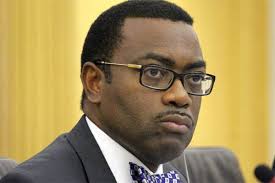E-Financial
AfDB Expects Nigeria’s Economy to Grow at 2.1% in 2018

The African Development Bank (AfDB) has predicted a positive outlook for Nigeria’s economic in 2018.
The bank in its 2018 African Economic Outlook projected that Nigeria’s economy would grow at 2.1 per cent in 2018 and 2.5 per cent in 2019.
According to AfDB, this outlook is anchored on higher oil prices and production, as well as stronger agricultural performance.
Notwithstanding this positive outlook for the country, the AfDB said Nigeria still faces significant challenges, including foreign exchange shortages, disruptions in fuel supply, power shortages, and insecurity in some parts of the country.
“In addition, revenue mobilization efforts are insufficient; at 5 per cent, value added tax rates are among the lowest in the world, and revenue administration is inefficient. Poverty is unacceptably high; nearly 80 per cent of Nigeria’s 190 million people live on less than $2 a day,” the bank said in its report.
Looking into the future, the AfDB economic prediction on Nigeria noted that “oil prices rebounded to an average of $52 per barrel (Brent crude) in 2017 and are projected to reach $54 in 2018, up from $43 per barrel in 2016.”
“Oil production also increased from 1.45 million barrels per day in the first quarter of 2017 to 2.03 million in the third quarter of 2017 following de-escalation of hostilities in the Niger Delta region and is expected to remain at the same level in 2018 and 2019, in tandem with the Organization of the Petroleum Exporting Countries (OPEC) production restrictions,” AfDB added.
E-Financial
Nigerian Banks End Years of Embargo, Resume Intl Transactions on Naira Cards

Nigerian banks have resumed international transactions on naira-denominated debit cards, marking a significant shift in banking operations for customers who rely on foreign payments.

This is coming nearly three years of suspension.
United Bank for Africa (UBA) and Wema Bank, in separate communications to their customers, announced the restoration of international payment services on their naira cards.
In a notice to its customers, UBA said the reactivation of international transactions on its premium naira cards aligns with its commitment to delivering improved and seamless banking experiences.
“We are pleased to inform you that all UBA Premium Naira Cards, including Gold, Platinum, and World variants, are now enabled for international transactions,” the bank stated.
“This means you can now use your Premium Naira Card for global payments — including online shopping, POS, and ATM transactions — with ease and flexibility. If you haven’t used your card recently, now is a great time to rediscover the convenience and prestige that comes with being a UBA premium cardholder.”
Similarly, Wema Bank announced that its customers can now make dollar payments on international platforms using their naira Mastercards.
“Your Wema Naira Mastercard just went global!” the bank said. “Now you can pay in dollars on all your favourite international platforms — Amazon, eBay, AliExpress, Netflix, Spotify, YouTube.”
The development marks a major relief for Nigerian customers who have had to rely on dollar cards or alternative payment methods since most banks suspended international usage of naira cards in 2021 due to foreign exchange scarcity.
E-Financial
Flutterwave Secures 20 more US Money Transmitter Licences

Flutterwave, Africa’s leading payments technology company, today announced the relaunch of its flagship remittance solution, Send App, across U.S. states following its newly acquired Money Transmitter Licences (MTLs).

This comes after Flutterwave secured 20 additional MTLs in the U.S., adding to the 14 licenses the brand has held since 2023.
Altogether, this achievement raises Flutterwave’s total number of direct licenses to 34, allowing the company to operate across many U.S. states and territories without partners or intermediaries.
Users in the U.S. can now send money to Nigeria, Ghana and Egypt, unlocking new remittance corridors that were previously unavailable.
Alongside this expansion, the onboarding process has been streamlined with a quick ID check, making it faster and easier for new users to get started.
Additional improvements include optimised payment support for US-issued Visa and Discover cards, enhanced security measures to safeguard transactions and maintain compliance, and improved in-app flows for a simpler, more efficient sending experience.
This return also highlights Flutterwave’s commitment to delivering a seamless, secure, and regulatory-compliant user experience for all Send App customers in the U.S. Users can now send money from DC, Georgia, Maryland, North Carolina, Michigan, South Carolina, Tennessee.
Other U.S. states and territories where Send App by Flutterwave supports outward remittances include Alaska, Arizona, Arkansas, Delaware, Idaho, Illinois, Indiana, Iowa, Louisiana, Maine, Minnesota, Mississippi, and Missouri, Nebraska, New Hampshire, New Mexico, North Dakota, Oklahoma, Oregon, Puerto Rico, Rhode Island, South Dakota, Utah, Washington, West Virginia, Wisconsin, and Wyoming.
Commenting on the relaunch, Olugbenga “GB” Agboola, Flutterwave Founder and CEO, said, “By expanding our reach and enhancing our services, we are empowering millions of Africans in the U.S. to maintain strong financial ties with their home countries, support their families, and contribute to economic development across the continent. Additionally, we are staying true to our core mission of bridging Africa with the global economy and vice versa.”
Earlier this year, Flutterwave integrated Swap into Send App for seamless FX transactions and strengthened its services in Ghana by securing approval for inward remittance from the Bank of Ghana.
E-Financial
Court Affirms NIBSS Authority to Manage BVN

Federal High Court in Abuja on Friday affirmed the authority of the Nigeria Inter-Bank Settlement System (NIBSS), to manage the Bank Verification Number (BVN), database across the country, in line with the Central Bank of Nigeria (CBN), Act and other relevant banking laws.

This is according to a judgment delivered by Justice James Omotosho on Friday.
Wolemi Esan, senior advocate of Nigeria, NIBSS’s counsel, and Kofo Abdulsalam-Alada, lead counsel for the CBN, among others, had sought a restraining order to prevent any institution in Nigeria from challenging the agency’s statutory authority to maintain and manage the BVN database.
This comes as NIBSS had alleged that Digital Rights Lawyers Initiative filed multiple suits, either directly or through proxies, challenging its authority to manage the BVN database and claiming that such management violates constitutional privacy rights.
However, Justice Omotosho, delivering his judgment, said the BVN does not infringe on the constitutional right to privacy.
“The initiative does not infringe on the constitutional right to privacy but rather serves as a necessary tool for safeguarding public interest and enhancing financial security.
“NIBSS has the power to manage the BVN,” the judge said, citing relevant CBN laws.
“The court grants the reliefs of NIBSS as prayed,” he stated.

 E-Financial2 days ago
E-Financial2 days agoCourt Affirms NIBSS Authority to Manage BVN

 Telecom2 days ago
Telecom2 days agoMTN, 9mobile Commence Ground-breaking National Infrastructure Partnership

 E-Financial2 days ago
E-Financial2 days agoNigerian Banks End Years of Embargo, Resume Intl Transactions on Naira Cards

 General News2 days ago
General News2 days agoCybervergent Selected as World Economic Forum’s 2025 Technology Pioneer Company

 E-Business2 days ago
E-Business2 days agoNIMC Says NIN Services Back Online

 Telecom2 days ago
Telecom2 days agoKarl Toriola Champions Digital Education for Employability @Sigma Club Lecture

 E-Business2 days ago
E-Business2 days agoReport Reveals African Organizations Dangerously Overestimating Cyber defences

 E-Financial2 days ago
E-Financial2 days agoFlutterwave Secures 20 more US Money Transmitter Licences



























